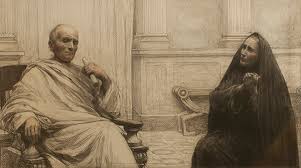 One of the keys to understanding the meaning of this Gospel can be found in the description of the judge as corrupt and unjust. Jesus is saying that if even an unjust judge responds to the persistence of the widow, how much more will God heed our prayers. Didn’t Jesus say: “Ask and you shall receive?” Jesus is telling us that God wants us to be like the persistent widow, persisting in our relationship with God, confident that God hears and answers prayers. Jesus also understands how easy it is to lose heart. Maybe that’s why Jesus asks: “Will such faith be found when the Son of Man returns?”
One of the keys to understanding the meaning of this Gospel can be found in the description of the judge as corrupt and unjust. Jesus is saying that if even an unjust judge responds to the persistence of the widow, how much more will God heed our prayers. Didn’t Jesus say: “Ask and you shall receive?” Jesus is telling us that God wants us to be like the persistent widow, persisting in our relationship with God, confident that God hears and answers prayers. Jesus also understands how easy it is to lose heart. Maybe that’s why Jesus asks: “Will such faith be found when the Son of Man returns?”
The Gospel implies “yes” but it may be in unexpected places, not among the ones certain of their own righteousness, but among the “widows” among us – the outsiders, the unlovely, the unclean, the ones certain of their sinfulness.
If we could read the Greek version of this parable, we’d get a glimpse of Jesus sense of humor. In the Greek Scriptures the judge gives in to the widow because if he doesn’t he fears she may give him a black eye. Jesus uses this metaphor from boxing to make his point about the need to continue in prayer. Be as persistent as a boxer in the ring.
We say, but do we really believe, God always answers our prayers. We just don’t know WHEN because God takes the long view. Sometimes we have to wait for answers until we’re, as they say: on the other side of the grass.”
Now, I think it’s a safe bet that I don’t have to explain “stubbornness.” Some of us had it sprinkled on us in our  cradles! We can prettify it, call it by another name, whatever we want: high principles, perseverance, tenacity, determined or we can call it what it is: just plain pig-headedness.” Some of us seem to be naturally endowed with the “great gift of stubbornness.” We ask God’s help to learn how to be stubborn for the right causes. In that case, we may talk about a “holy stubbornness.” That happens when we start not only to say our prayers, but when we start to live our prayers. In other words, we put our actions where our words are … we put flesh on our Corporate Commitment.
cradles! We can prettify it, call it by another name, whatever we want: high principles, perseverance, tenacity, determined or we can call it what it is: just plain pig-headedness.” Some of us seem to be naturally endowed with the “great gift of stubbornness.” We ask God’s help to learn how to be stubborn for the right causes. In that case, we may talk about a “holy stubbornness.” That happens when we start not only to say our prayers, but when we start to live our prayers. In other words, we put our actions where our words are … we put flesh on our Corporate Commitment.
“Will the Son of man find faith when he returns?” That depends. Can prayer move our own arms? Are we willing to put flesh on our words? God always has relied on his children–people like you and me–to usher in His Kingdom. Are our prayers effective? The answer lies squarely with each of us: “it depends on how effective we help make them.”
And, just suppose as Fr. Ed (Lamp) suggests (based on an idea he gleaned from S. Melannie Svoboda) that the characteristics of the widow and the judge are reversed:
What happens, if we say that we are the judge and God is the widow? We, like the judge in the parable, are basically unjust. And, sometimes we have no fear of God; that is, we do not allow God to scare us into being good. Similarly, like the judge we persist in refusing to listen to the cries of the poor all around us.
So, suppose God is the persistent widow who will not go away. God keeps badgering us, refusing to accept as final our “no” to love. God will persist until we render a just judgement, that is, until we let the goodness out, until we learn to love. In Genesis we are told we are made in the image and likeness of God. (Fr. Ed suggests) Perhaps our prayer this week could be: “Dear God, Persevering One, make us more like you!”
(See prayer down below)
|
Continue Reading

